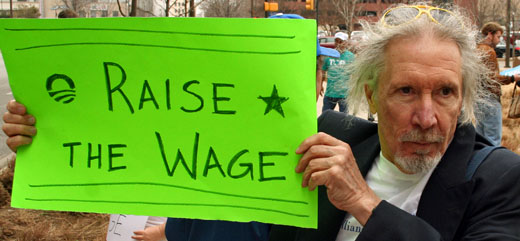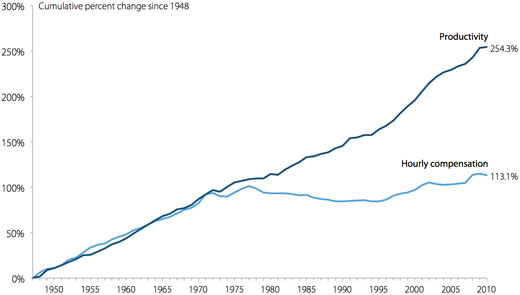Wages Are Low, but Why?

Even the Dallas newspaper is now admitting that low wages are a major problem in the U.S. economy. Their lead article on September 9, 2014, was "Pay: Missing piece of recovery puzzle." They say, "...overall inflation-adjusted wages have essentially flattened since 2009." They also point to the dreadful increase in involuntary part-time workers: "There are 7.2 million involuntary part-timers, up from 4.6 million in late 2007."

How do they explain it? "Economists are flummoxed..." and "The trend has mystified analysts."
The situation for American workers is a lot more drastic than the pay issue. The Dallas paper doesn't mention how many people have lost their pensions (2 out of 5 since 1980), or the incredible increase in employees' share of health care costs. They don't say that regressive sales and property taxes have hit workers harder while progressive income, inheritance, and luxury taxes have become much less of a burden for the wealthy. They don't mention that government services for the working poor are disappearing and that abject poverty, especially for families with children, is skyrocketing.
Again, why?
The answer is government policy. Since 1980, government has steadily reduced the tax burden on the rich (they are building support right now to lower the corporate tax rate). State and local governments have increased the tax burden on the poor. Government has encouraged offshoring of jobs. They have drastically cut services at all levels of government. They have turned other services into profit-generating privatization schemes. They have laid off government and government-contracted workers.
The present long-lasting recession is the direct result of government fiscal policy. Even while we've been fooled into watching anti-recessionary monetary policy from the Federal Reserve, fiscal policy (budgets) has continued to aggravate the recession.
Almost the only chance that American workers have to defend their wages is through their unions, and anti-union legislation has sprouted up everywhere. Even our right to vote for better policies and better politicians is under attack.
Again, why?
From 1945 to the mid-1970s, American industry ruled the world. Our competitors were bombed flat during World War II. But our competitors came back with new factory equipment and low costs. They began to take over markets, such as the automobile market, that had been dominated by the U.S..
Faced with the new international competition, American leaders might have worked out a cooperative scheme so that everybody would keep getting a fair slice of an increasing economic pie. But that isn't how the system works.
By 1980, with the election of Ronald Reagan, economic and political leaders of the United States set out a policy of winning worldwide competition. They did it, to a large extent with military might, just as they had since World War II. But they also competed economically the way that nations and businesses usually compete.
They cut costs.
We're the costs.
The main cost of economic production is labor, and that is what they cut and are still cutting.
Us. Labor. That's what's being cut in the name of winning the international competition. The U.S. has been, and is being, fairly successful at it. For the captains of industry and the political leadership, it's working, and they intend to keep it up.
For us, it really is a race to the bottom.
--Gene Lantz
9/10/14